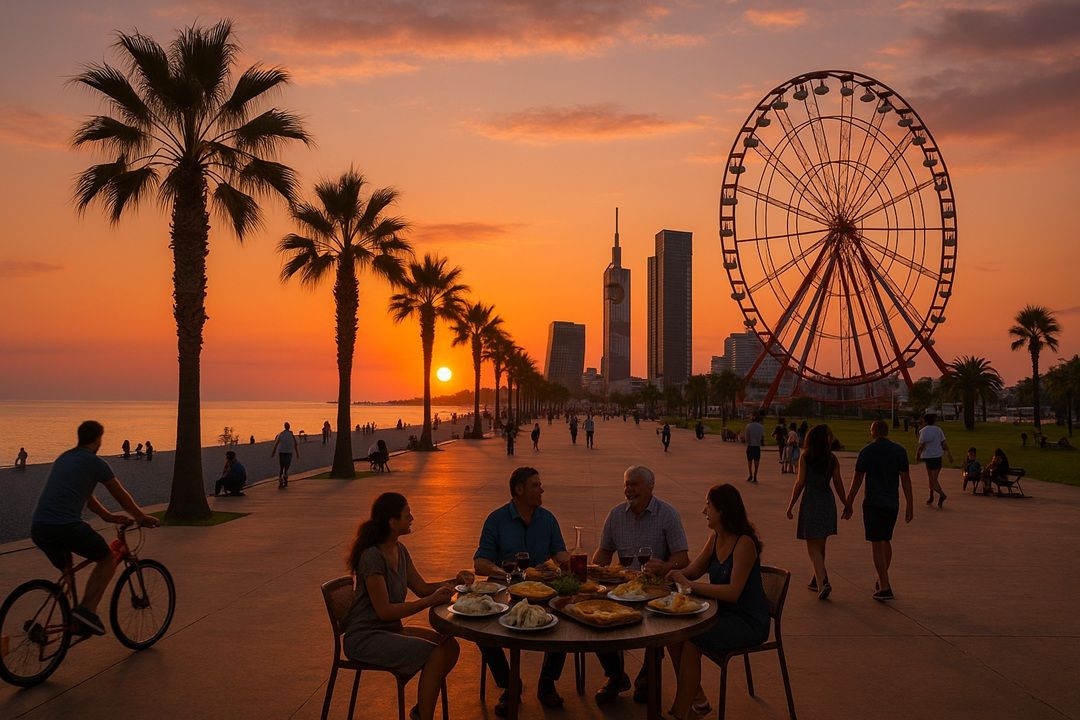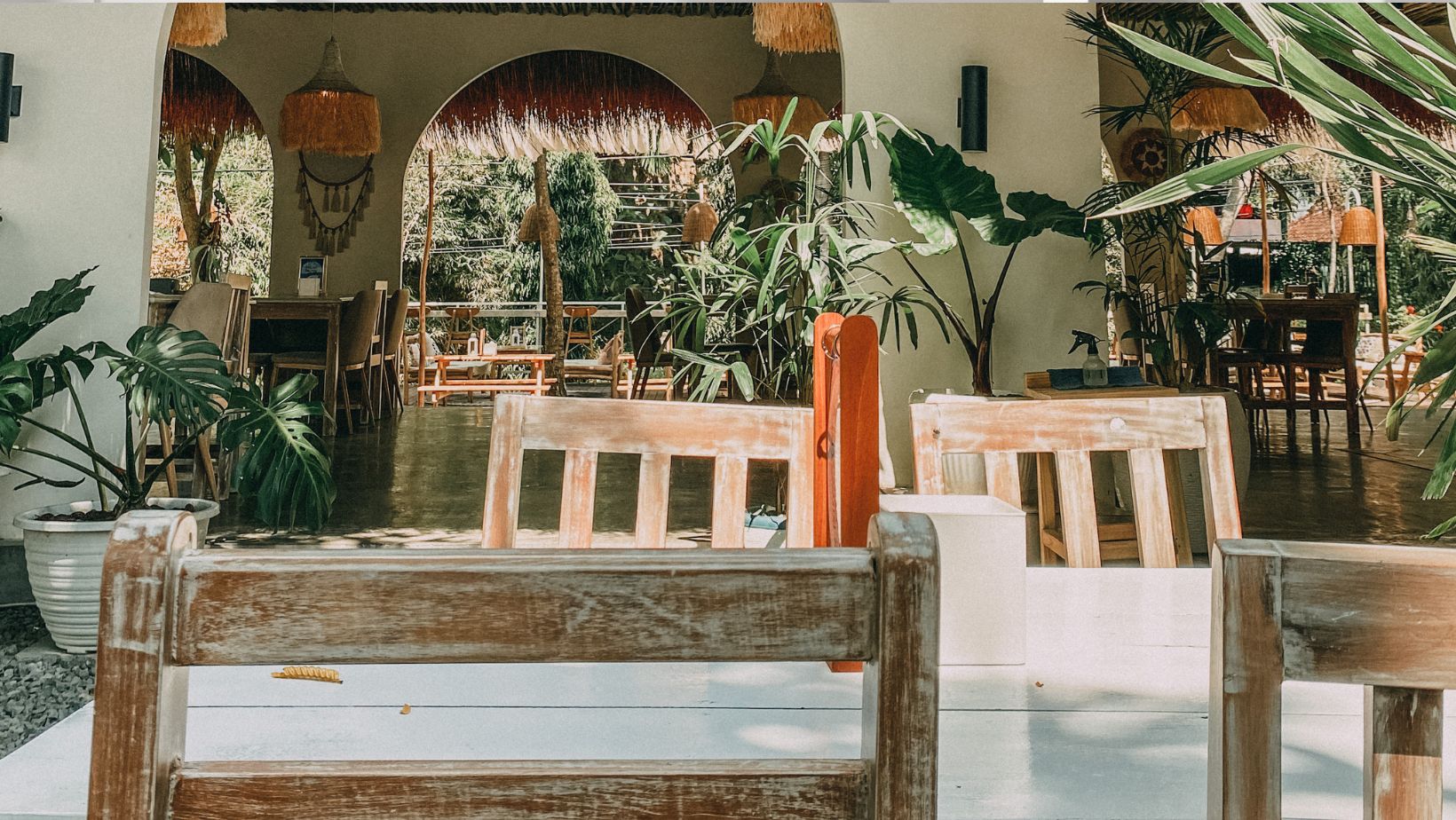
A personal guide to Georgia’s most curious seaside town
You think you’re arriving at a beach resort. Batumi has other plans
When you first get to Batumi, you might expect the usual coastal scene — umbrellas, lounge chairs, music from the cafés. But within minutes, the city quietly shifts the focus. It’s not interested in impressing you with perfect beaches or postcard sunsets. It just exists — chaotically, charmingly, fully.
One moment you’re walking past palm trees under Soviet-era balconies, the next — under a shimmering glass tower with a rooftop helipad. An old woman sells grapes from a plastic bucket next to a man in an all-white suit. It’s a mix that shouldn’t work — but somehow does.
The sea is nice, but it’s not why you’ll stay
Locals don’t treat the sea like a showpiece. It’s just there — part of the everyday rhythm. People head to the beach barefoot, holding bags of fruit, sometimes alone, often with family, rarely in a rush. The central beach is wide, pebbled, and usually busy by late afternoon. The water is clean, and depending on the month, either refreshing or borderline cold — but never boring.
If you’re looking for quieter spots, head south. The beaches in Kvariati and Sarpi are practically pressed up against the Turkish border. The sea there is glassy, and the air smells like mint and salt. In Gonio, it’s more family-oriented — grilled trout, corn sellers, kids building towers out of stones.
Best time to go is early in the day. And if you want to escape the crowds or visit the coastline on your own schedule, grab a Getmancar — carsharing works well here, and it’s easy to pick up a vehicle via the app. And if you’re planning to explore the surrounding region or drive up and down the coast for a few days, consider car rental in Batumi — it’ll make the whole trip a lot smoother.
The kind of city that walks with you
Batumi is not a place you “do.” It’s a city that walks beside you.
In the mornings, it leads you through the quiet Old Town — balconies with drying laundry, cats in windows, coffee brewing somewhere behind thin curtains. Later, it takes you through the buzz of Europe Square or past the alphabet tower where tourists argue about who’s taller. By evening, it’s waiting for you near the statue of Ali and Nino, where the sea breeze carries music from a violinist you didn’t plan to hear.
You might spend hours walking the boulevard — not because there’s a checklist of landmarks, but because it feels good. Good to breathe here. Good to just move with no rush. The city doesn’t beg for attention. It just gives space for you to feel — present, relaxed, curious.
Getting around is part of the fun
The central part of Batumi is walkable — most things really are “ten minutes from here.” But when your feet need a break, the city is ready. Scooters are everywhere, rentable with just a tap on your phone. Bikes can be picked up along the promenade. Taxis and Bolt work well and won’t break the bank.

And if you’re up for exploring — maybe a quick trip to Mtsvane Kontskhi, the Botanical Garden, or a beach further down the coast — it’s totally worth hopping into a car. That’s where Getmancar comes in, especially for short trips. But for longer journeys or multi-day plans, booking a car rental in Batumi will save you time, money, and a lot of logistical stress.
When to go, where to stay, what to know
Batumi is best from late May through June or in September, when the heat calms down and the city breathes more easily. July and August bring more people, more traffic, and a hotter kind of chaos — fun for some, frustrating for others.
Where you stay depends on your style. A guesthouse near Piazza gives you that “live like a local” feeling. Some boutique hotels serve shakshuka in the morning and mint tea on the terrace. And of course, there’s always the option of a rental apartment with a balcony overlooking the sea — perfect for those long, quiet mornings that turn into late starts.
And then there’s the food.
Here, it’s a little different from the rest of Georgia — lighter, greener, a bit more sea-scented. Grilled fish is everywhere. The local cafes in the harbor serve fresh catch with tkemali sauce and a slice of lemon, while upstairs terraces offer wine and breeze in equal measure.
You won’t leave with a list — you’ll leave with a feeling
Batumi isn’t designed to overwhelm you. It doesn’t throw sights at you or drag you into tourist traps. Instead, it moves slowly. It lets you notice neighbors playing backgammon on the sidewalk, smell coffee at sunrise, hear someone singing through an open window and wonder what story lives in that voice.
And maybe, when you’re packing your bags, you won’t even remember which day you saw the ferris wheel or which alley had that perfect mural. But you’ll remember how the sunlight looked between the palm trees. The way your feet felt after a day walking the boardwalk. The taste of fried eggplant with walnut paste on your lips and sea salt in your hair.
That’s Batumi.
And that’s more than enough.


















